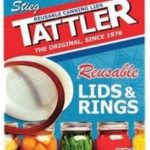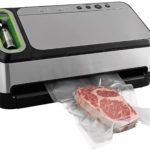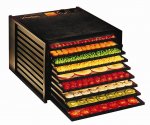 Purchase or preserve fruits and vegetables to supplement your core foods.
Purchase or preserve fruits and vegetables to supplement your core foods.
Key Points
- When looking at food storage calculators, you may notice fruits and vegetables are often left off. This is because you can sustain life with the ingredients on those calculators (you can sprout a number of those ingredients to get fresh vegetable sources). HOWEVER, we HIGHLY recommend storing fruits and vegetables for the health benefits, variety, and to help you save money on your day to day grocery shopping.
- There are three different options for obtaining your preserved produce:
- Grow your own and dehydrate/can/freeze it yourself
- Purchase it in bulk and dehydrate/can/freeze it yourself
- Purchase commercially preserved fruits and vegetables
Growing Your Own Fruits and Vegetables

- We HIGHLY recommend learning to grow your own foods. This can range from just planting a peach tree and growing some tomatoes in a container, to a full-fledged farm-type situation.
- Our favorite method to use for growing vegetables is square foot gardening which allows you to grow a LOT of veggies in a small space.
- If you have space and don’t mind the mess fruit trees and vines can be a great cost-savings. You can also try to ask neighbors with fruit trees if you can pick their excess fruit.
Dehydrated or Freeze-Dried
- Dehydrated fruit makes a great snack with things like banana chips, craisins, dried apples, etc.
- Dehydrated vegetables are wonderful additions to soups/stews. Items such as dehydrated onions can save you time and hassle in your everyday cooking.
- You can purchase a food dehydrator like the Excaliber
- If you don’t want to go through the hassle of dehydrating foods on your own, you can purchase a lot of the items at stores like Emergency Essentials or Thrive Life.
Canned/Bottled

- You can bottle a wide variety of things such as salsa, pie fillings, applesauce, juice, spaghetti sauce, almost any fruit or vegetable, pickles, all sorts of jams and jellies, etc.
- If you can get fresh fruits/vegetables for free or at a significant discount, then canning them yourself can save you a LOT of money over cans from the store.
- Home-bottled foods have less preservatives, taste better, and you can adjust the amounts of sugar you use to fit your family’s preferences. So we feel like it is worth it to can them on your own even if you have to purchase the produce.
- Bottling can be a fun bonding experience with friends/family and also it is a great way to build up your whole year supply of items all at one time.
- If you choose to purchase cans of fruits and vegetables, you can either purchase a extra few cans each time you shop until you have built up your year supply or stock up when there are good sales.
Frozen

- If you have an extra freezer then frozen fruits and vegetables are another great option. If there is a water shortage then you don’t want to have all your foods be dehydrated.
- Freezing produce takes much less time and preparation than home bottling, and can often be done using less sugar or other preservatives.
- If you don’t have home-grown foods, you can purchase fresh produce in bulk to freeze, or simply buy bags of frozen fruits and vegetables and try to use sales and coupons.
More Information
Where to Buy Freeze-Dried/Dehydrated Fruits and Vegetables
 |
Helpful Products
 |
TATTLER CANNING LIDS: The tattler lids are reusable canning lids that include a plastic lid and a rubber gasket that provides a similar seal to traditional canning lids. It’s nice to not have to throw away the disposable ones after each use. |
 |
FOODSAVER VACUUM SEALERS: If you are dehydrating your own foods, a vacuum sealer can help to extend the shelf life on them. You can also get a jar lid attachment and seal items in mason jars. |



 Hi there! I’m Jodi. I share my preparedness adventures via the blog and social media so you can see what I’m working on day to day.
Hi there! I’m Jodi. I share my preparedness adventures via the blog and social media so you can see what I’m working on day to day.